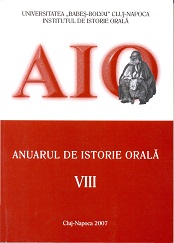LAZĂR DE LA RUSCA MITBIOGRAFIA ÎN COMUNISM ŞI POSTSOCIALISM
“Lazar of Rusca” Myth-biography in Communism and Post Socialism
Author(s): Ionuţ CosteaSubject(s): History
Published by: Argonaut
Summary/Abstract: The representation of the hero-martyr by the communist ideology during ‘50s defines a myth-biography assimilated by official history shaped according to the political power. In fact it is a commemoration in which language becomes partner of the political power. In post socialism, myth-biography detaches from propaganda ubiquity and stands for a series of representation of Lazar Cernescu that are associated to social points of view. Partisans, the opponents against communism, “bandits” in official discourse regarded him as a traitor, an opportunist. In this respect he is associated to the communists and Security so one can receive an upside down image. After 1989 a great part of the representations were transferred to the other part: the opponents, the “bandits” became “fighters against communism” and become heroes. Lots of festivities took place, lots of monuments were built to remember them, lots of associations of former opponents were set up. On the other hand, communists were condemned because of the past events and also for the actual lickings. Although we identify a very strong movement against communism, paradoxically, we cannot identify communists. All of them retreated to full of prestige area: politics, economy etc. In these conditions, for the fighters against communism in Banat Mountains, Lazar remained a tragic event. On the one hand, our witnesses dealt with the people justice so they were reserved at the beginning of our interviews but later they were communicative. Secondly, we have to take into consideration the age of the witnesses, most of them toward the end of their lives, when they assume a kind of a very important part in the event, or they comment the event, or they even neglect facts they didn’t understand or cannot connect them to the theme. At the level of community, the assassination of Lazar germinated a real story and Lazar and communism are to be condemned. Also, the polemic character of the brother and daughter stories cannot be denied. They try to preserve the prestige of a loving and caring father and brother. Some clichés are to be also noted regarding Lazar biography either partisans or communists points of view. To sum up, we consider we have to deal with a sort of manipulation regarding the biography of the hero-martyr vs. traitor/communist/Security informer, before and after 1989, during communism and after post socialism. This manipulation meant romancing by inventing myths we dealt with in this study.
Journal: Anuarul Institutului de Istorie Orală
- Issue Year: 2007
- Issue No: VIII
- Page Range: 173-232
- Page Count: 60
- Language: Romanian

